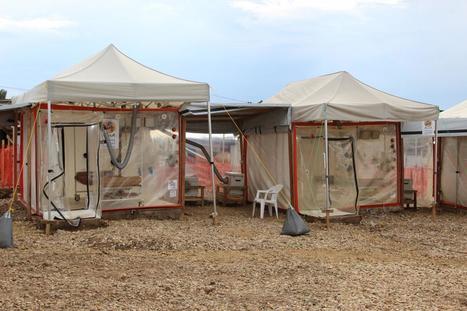Study leaders publish results from NIH-DRC-WHO clinical trial of four experimental therapies. The investigational therapeutics mAb114 and REGN-EB3 offer offer patients a greater chance of surviving Ebola virus disease (EVD) compared to the investigational treatment ZMapp, according to published results from a clinical trial conducted in the Democratic Republic of the Congo (DRC). The new report also shows that early diagnosis and treatment are associated with an increased likelihood of survival from EVD. The results appear online this week in The New England Journal of Medicine. An announcement made on August 12, 2019, noted that the study leaders halted the trial early, on August 9, 2019, as recommended by an independent data and safety monitoring board based on its review of preliminary data from 499 study patients. The preliminary analysis found that both mAb114 and REGN-EB3 performed better than ZMapp. The fourth drug, remdesivir, performed similarly to ZMapp. Today’s publication provides a comprehensive analysis of the full dataset from nearly 200 additional patients enrolled in the clinical study.
The clinical trial known as PALM, short for “Pamoja Tulinde Maisha,” a Kiswahili phrase that translates to “together save lives,” was organized by an international research consortium coordinated by the World Health Organization (WHO). It is led and funded by the DRC’s National Institute for Biomedical Research (INRB) and Ministry of Health, and the National Institute of Allergy and Infectious Diseases (NIAID), part of the U.S. National Institutes of Health. Professor Jean-Jacques Muyembe-Tamfum, M.D., Ph.D., director-general of the INRB and head of the DRC’s Ebola response, and Richard T. Davey, Jr., M.D., deputy director of NIAID’s Division of Clinical Research, are co-principal investigators for the study....The study enrolled 681 people with Ebola virus disease between November 2018 and August 2019 at four Ebola treatment centers (ETCs) in the cities of Beni, Butembo, Katwa and Mangina. Staff from The Alliance for International Medical Action (ALIMA), International Medical Corps (IMC), Médecins Sans Frontières/Doctors Without Borders (MSF) and the DRC Ministry of Health implemented the trial at the ETCs with support from Congolese staff, the World Health Organization, the Frederick National Laboratory for Cancer Research and The Mitchell Group.
The final analysis included 673 participants. The trial began in November 2018 with randomized administration of remdesivir, mAb114 and ZMapp, and the protocol was amended to include REGN-EB3 in January 2019. As a result, the number of outcomes included in the ZMapp comparator group was slightly different for the initial arms (remdesivir and mAb114) relative to the number of outcomes in the ZMapp comparator group for REGN-EB3, based on time of enrollment. Overall mortality was 50% (84/169) in all patients treated with ZMapp and 51% (79/154) in patients who received ZMapp during the time that REGN-EB3 was included as another trial arm. Mortality rates were lower for mAb114 and REGN-EB3 compared to their respective ZMapp cohorts: 35% (61/174) of patients in the mAb114 treatment group and 34% (52/155) of patients in the REGN-EB3 group died by 28 days post-treatment. The mortality rate in the remdesivir treatment group, 53% (93/175), was similar to ZMapp. Overall, mortality rates were lower in patients who had less virus in their blood at the time of enrollment (19% overall, with 10% for mAb114, 11% for REGN-EB3, 29% for remdesivir and 25% for ZMapp overall). Mortality rates were higher in patients with more virus in their blood at the time of enrollment (76% overall, 70% for mAb114, 64% for REGN-EB3, 86% for remdesivir and 85% for ZMapp). The analysis also showed that patients receiving either mAb114 or REGN-EB3 cleared the virus from their blood more quickly than participants receiving ZMapp. Investigators note that the trial data demonstrate the importance of early diagnosis and treatment. Patients arriving at the ETC within one day of reported onset of symptoms had a mortality rate of 19%, while patients arriving after five days of symptoms had a mortality rate of 47%. The odds of death increased 11% each day that a person delayed going to an ETC. The authors note that despite encouraging findings regarding mAb114 and REGN-EB3, approximately one-third of patients who received these therapeutics died, highlighting the potential to improve upon these results, whether through further optimization of supportive care, combination therapy using agents with complementary mechanisms of action or other strategies....
Published in New England Journal of Medicine (27 November, 2019):



 Your new post is loading...
Your new post is loading...







